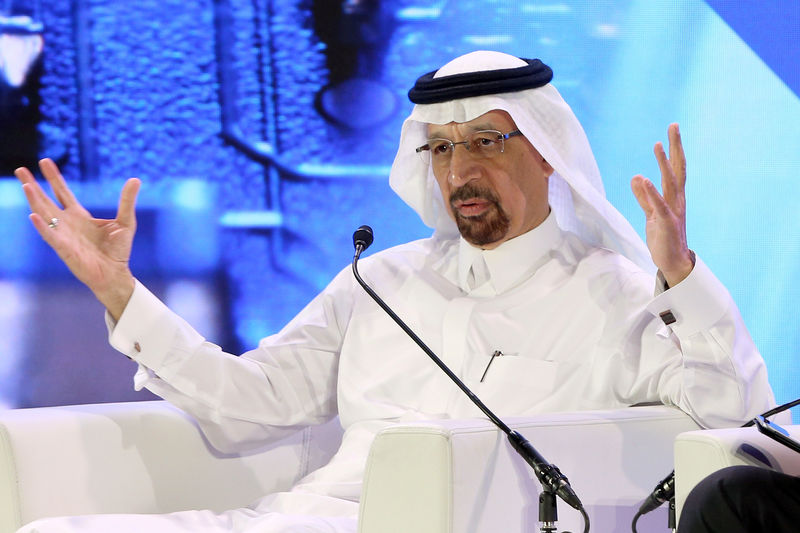By Rania El Gamal and Vladimir Soldatkin
JEDDAH, Saudi Arabia (Reuters) - Saudi Arabia's Energy Minister Khalid al-Falih said on Saturday that he saw no oil supply shortage as global oil inventories are still rising, particularly from the United States, but OPEC will be responsive to the oil market's needs.
Speaking in Jeddah ahead of a ministerial panel gathering on Sunday of top OPEC and non-OPEC producers, including Saudi Arabia and Russia, Falih told Reuters OPEC will not decide on output until late June when the group is due to meet next.
"I am not sure there is a supply shortage, but we will look at the (market) analysis. We will definitely be responsive and the market will be supplied," Falih said, when asked whether an increase in output was on the table due to oil shortage concerns.
"But all indications are that inventories are still rising. We saw the data from the U.S. week after week, and they are massive increases, so there is obviously supply abundance."
The Organization of the Petroleum Exporting Countries (OPEC), Russia and other non-OPEC producers, known as OPEC+, agreed to reduce output by 1.2 million barrels per day (bpd) from Jan. 1 for six months, a deal designed to stop inventories building up and weakening prices.
"We will be flexible. We are going to do the right thing as we always do," Falih said of any decision at the meeting in June on continuing the reductions.
Falih said OPEC was guided by two main principles: "One to keep the market in its direction towards balancing, and inventories (are) back to normal level. And two to be responsive to market needs. We will strike the right balance I am sure."
Saudi Arabia does not see a need to quickly boost production now with oil prices around the $70 a barrel level, as it fears a crash in prices and a build-up in inventories, OPEC sources said. But Russia wants to increase supply after June when the current OPEC+ pact is due to expire, the sources said.
The United States on the other hand, which is not a member of the OPEC+ but is a close ally of Saudi Arabia, wants the group to boost output to bring oil prices down.
Falih has to find a delicate balance between keeping the oil market well supplied and prices high enough for Riyadh's budget needs, while pleasing Moscow to ensure Russia remains in the OPEC+ pact, and being responsive to the concerns of the United States and the rest of the OPEC+, the sources said.
OPEC's agreed share of the cuts is 800,000 bpd, but its actual reduction is far larger due to the production losses in Iran and Venezuela. Both are under U.S. sanctions and exempt from the voluntary reductions under the OPEC-led deal.
U.S. President Donald Trump has called on OPEC and the group's de facto leader Saudi Arabia to lower oil prices.
Sunday's ministerial panel meeting, known as the JMMC, comes amid concerns of a tight market as Iran's oil exports are likely to drop further in May, and shipments from Venezuela could fall more in coming weeks due to the sanctions by Washington.
Oil contamination also forced Russia to halt flows along the Druzhba pipeline - a key conduit for crude into Eastern Europe and Germany - in April. The suspension, as yet of unclear duration, left refiners scrambling to find supplies.
But U.S. crude inventories rose unexpectedly last week to their highest since September 2017, while gasoline stockpiles decreased more than forecast, the Energy Information Administration (EIA) said on Wednesday.
Tensions between Saudi Arabia and fellow OPEC member Iran are also running high, after last week's attacks on two Saudi oil tankers off the coast of the United Arab Emirates and another on Saudi oil facilities inside the kingdom.
Saudi Arabia accused Iran of ordering the attack on state oil giant Saudi Aramco's oil pumping stations that Yemen's Iran-aligned Houthi militia has claimed responsibility for.
An OPEC and non-OPEC technical committee found that oil producers' compliance with the supply-reduction agreement reached 168 percent in April, three sources told Reuters on Saturday.

That shows that OPEC+ producers are cutting output by more than their share. Saudi Arabia has been pumping below its production target since January to keep oil inventories and prices in check.